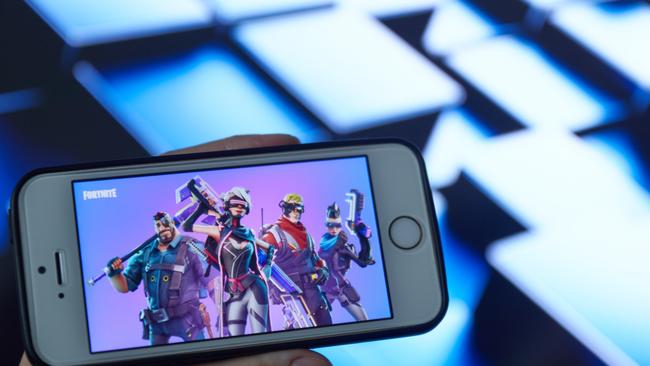‘Fortnite’ kicked off Apple’s app store
The popular game is the latest victim in an escalating battle between the tech giant and developers.

Apple and “Fortnite” maker Epic Games are embroiled in a battle over the fees that app stores charge developers, a clash that pits the powerful tech giant against the creator of one of the world’s most popular video games.
The conflict reflects growing pushback against the app platforms of Apple and Google. Other app makers, including Netflix and Spotify have also clashed with Apple over its developer fees. At stake is a global market for mobile apps that by some estimates generates roughly $85 billion annually excluding China.
Apple on Thursday yanked the Fortnite app from its App Store, restricting game downloads and updates on Apple devices, after Epic rolled out a new way of making in-game purchases that circumvents the 30 per cent cut Apple takes from digital transactions within apps. Apple said it removed “Fortnite” because Epic launched the payments feature without its approval.
“Fortnite,” which made its debut in 2017, has more than 350 million registered players worldwide, according to closely held Epic. The survival game is free to download but generates revenue through in-game purchases of add-on items such as digital costumes and dance moves for players’ avatars.
Epic’s new payment system was also made available on devices with Google Play, an apparent violation of Google’s rules. Google hadn’t removed “Fortnite” from its store as of Thursday afternoon. The company didn’t respond to requests for comment.

Epic’s move was seen by many as a tacit declaration of war against Apple and Google, as the company took the additional step of offering players 20 per cent back on their in-game purchases over the past month. The discount was extended to purchases of V-bucks — virtual currency “Fortnite” players can use to buy character costumes, dance moves and other perks — made on gaming consoles, PCs and Macs.
Epic Chief Executive Tim Sweeney has waged a year-long public campaign against the App Store and Google Play store, saying their developer fees are exorbitant. On Thursday Epic released a video parody of Apple’s 1984 Super Bowl commercial skewering PC behemoth IBM and pushed users to promote the hashtag #FreeFortnite across the internet.
“We must all choose to fight a painful battle now, or accept an all-powerful middleman with unbounded ambition to extract tribute and limit innovation in the decades to come,” Mr. Sweeney said in an interview.
Epic sued Apple in US District Court in California after “Fortnite”’s removal from the App Store, accusing the world’s most valuable company by market capitalisation of monopolistic behaviour in how it distributes apps to devices and processes payments for digital content. Epic said it isn’t seeking monetary damages from Apple but asked the court to issue an injunction to end Apple’s “unreasonable and unlawful practices,” according to the complaint.
Apple didn’t comment on the lawsuit but did attack Epic for launching the payments feature without its approval.
“The fact that their business interests now lead them to push for a special arrangement does not change the fact that these guidelines create a level playing field for all developers and make the store safe for all users,” Apple said in a statement.
Wedbush Securities analyst Dan Ives described Epic’s action as a bold move and said the company was “testing the waters especially in light of the antitrust pressure that Apple has faced from the recent congressional hearings.”
“If the lawsuit is successful, it would open up a Pandora’s box for other app developers to make the same move,” Mr Ives said.
Last month, Apple Chief Executive Tim Cook defended Apple’s policies on its App Store during a more than five-hour-long congressional hearing with other tech company leaders. Prior to the hearing, Apple touted economic research it commissioned showing that the fees it collects from developers are in line with those charged by other app stores and video game marketplaces. Both Apple and Google have argued the fees are necessary because of the services the stores provide, including security and safeguarding user privacy.
The European Union in June opened antitrust probes into Apple to determine whether the company’s App Store and Apple Pay service violate competition laws.
Spotify last year filed an antitrust complaint in Europe against Apple accusing the tech giant of abusing the App Store to limit competition against Apple Music. In response to the lawsuit Apple said it wanted apps that compete with its services to thrive and that it approved and distributed app updates that helped expand Spotify’s business.
A spokesman for the music-streaming company commended Epic for its move, saying “Apple’s unfair practices have disadvantaged competitors and deprived consumers for far too long.”
Originally available only on computers and then consoles, “Fortnite” surged in users after launching on Apple’s App Store in 2018. It debuted on Google’s Play store earlier this year after Epic gave up a year-long battle with the company to get permission to include its own payment system inside “Fortnite” — essentially the step Epic took Thursday. Previously, “Fortnite” was available on devices running Google’s Android operating system independent of Google Play.
The “Fortnite” app has been installed 133.2 million times on Apple devices since its creation and has produced $US1.2 billion in global App Store revenue, according to research firm Sensor Tower Inc.
For the first seven months of this year, Apple’s App Store generated nearly $US39 billion in global revenue from in-app purchases, subscriptions and premium apps, while Google Play reached almost $US21 billion, Sensor Tower said.
Mobile games make up the largest portion of the global video game-software market, according to Newzoo BV. The analytics firm estimates mobile games will yield about $77.2 billion in revenue this year, compared with $US45.2 billion for console games and $36.9 billion for computer games.
The Wall Street Journal


